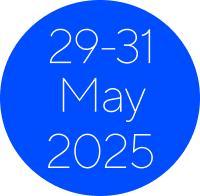Chair: Philip Van der Wees (Netherlands)
Speakers: Ken Harwood (United States), Henri Kiers (Netherlands), Nisrine Lattouf (Lebanon)
- To understand the characteristics and purposes of learning health systems
- To Identify principles of continuous quality improvement and interprofessional learning in learning health systems with application to physiotherapy
- To explore mechanisms for establishing learning health systems in the physiotherapy community across healthcare settings and infrastructures, specifically in low and middle income countries
Learning health systems for continuous quality improvement and learning
Learning health systems (LHS) integrate knowledge and practice through cycles of continuous quality improvement and learning to increase healthcare quality. Such continuous learning cycles include three general components: data to knowledge, knowledge to performance, and performance to data. To facilitate continuous learning cycles, an infrastructure is required in which data is generated and used for quality improvement. The concept of LHS has spread internationally and the different fields and sciences have been connected to stimulate an integrated approach. Establishing LHS requires a systematic approach in which multiple barriers have to be addressed, especially in in low and middle income countries with limited infrastructure and resources. The further establishment of LHS is important for the field of physiotherapy and requires international collaboration.
Learning health system at national level in the Netherlands
An exemplary LHS at national level , established in the Netherlands via the Foundation for Quality in Physiotherapy (SKF), will be presented. SKF aims to generate value for patients and society by employing a LHS approach for physiotherapists. With over 8,000 participating therapists, SKF operates on two levels: private practice and individual therapist. At practice level, patient data from electronic health records are collected. Feedback reports are returned to the practice, with access to an interactive dashboard for benchmarking against the broader SKF population. Audits are conducted by professional auditors alongside peer therapists to ensure compliance with SKF requirements. On individual level, peer learning sessions occur quarterly, facilitated by trained coaches, enabling therapists to discuss outcomes and mutual learning from in a safe environment. Therapists engage in ongoing education, and annual personal development plans.
Learning health system within a rehabilitation network in the United States
This example presents the results of a QI program based on evidence-based outcomes for patients with low back or neck pain. The program was conducted in three outpatient physical therapy settings of a large rehabilitation network serving as a LHS. Regular feedback reports of process and outcomes of care guided the QI efforts. Primary outcomes were changes in knowledge and attitudes of participants toward outcome measures, and their use of outcome measures. Semi structured interviews and a focus group were conducted to evaluate the perceived value of the QI program. Perceived benefits of the QI program included clinician and institutional accountability to processes and strategies aimed at continuous improvement in patient care. The QI program was feasible and well-accepted by the participants.
Learning health system initiated in a university setting in Lebanon
In Lebanon the infrastructure for electronic data collection and feedback reporting is limited. Quality improvement cycles have therefore been established through project based assignments for Doctorate physiotherapy (DPT) students. As part of their educational program, student conduct implementation projects based on data collection in their practice for continuous quality improvement. This allows for using LHS concepts in a low resource setting. Examples of such projects and avenues to overcome barriers in settings with limited infrastructure and limited resources will be presented.
- Foley T, Horwitz L, Zahran R. Realising the potential of Learning Health Systems. The learning Healthcare Project, The Health Foundation and Newcastle University, 2021
- Friedman C, Rigby M. Conceptualising and creating a global learning health system. International journal of medical informatics (Shannon, Ireland). 2012;82(4): e63-e71. https://doi.org/10.1016/j.ijmedinf.2012.05.010
- Friedman C, Rubin J, Brown J, et al. Toward a science of learning systems: a research agenda for the high-functioning Learning Health System. Journal of the American Medical Informatics Association: JAMIA. 2015;22(1):43-50. https://doi.org/10.1136/amiajnl-2014-002977
- Institute of Medicine. The Learning Healthcare System: Workshop Summary (IOM Roundtable on Evidence‐Based Medicine). Washington, DC: The National Academies Press, 2007.
- Menear M, Blanchette M-A, Demers-Payette O, Roy D. A framework for value-creating learning health systems. Health research policy and systems. 2019;17(1):79.
- McDonald PL, Phillips J, Harwood K, Maring J, van der Wees PJ. Identifying requisite learning health system competencies: a scoping review. BMJ Open. 2022 Aug 23;12(8):e061124
- McDonald PL, Foley TJ, Verheij R, Braithwaite J, Rubin J, Harwood K, Phillips J, Gilman S, van der Wees PJ. Data to knowledge to improvement: creating the learning health system. BMJ 2024; 25 (384): e076175
- van der Wees PJ, Balog EJ, Irrgang JJ, Zeleznik H, McDonald PL, Harwood KJ. Using feedback on patient health outcomes to improve orthopaedic physical therapist practice: a quality improvement study. BMJ Open Qual. 2024 Mar 1;13(1):e002338
- Verburg, K., Felius, R., Heymans, M., & Kiers, H. (2022). Resultaatindex Fysiotherapie. Ministerie van VWS.
- Learning Health Systems Toolkit: https://www.learninghealth.org/2021-lhs-toolkit.
See the 24 focused symposia to be presented at congress.
Find out who the key speakers at congress will be.
Find out which clinical topics will be covered in these discussion-based seminars.




